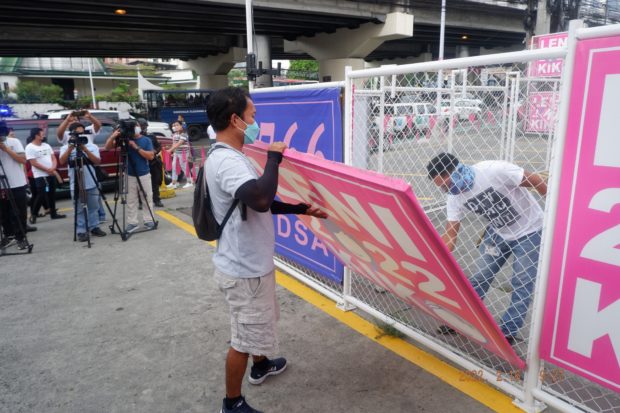Private property owners take case vs ‘Oplan Baklas’ to Supreme Court

FILE PHOTO: Personnel of Oplan Baklas take down an oversized billboard of a candidate. Image from Comelec / Facebook
MANILA, Philippines — Supporters of Vice President and presidential candidate Leni Robredo whose posters, tarpaulins, and murals were dismantled took their case to the Supreme Court (SC), asking it to declare as unconstitutional the “Oplan Baklas” of the Commission on Elections (Comelec)
Petitioners also asked the high court to immediately issue a temporary restraining order to stop the implementation of Oplan Baklas, which, they said, violated their constitutional right to freedom of speech and expression, as well as their right not to be deprived of property without due process of law.
The petitioners insisted that the poll body has no legal basis to regulate their political views considering that they are private citizens and these were manifested within their private properties.
A Comelec resolution “bars the installation of election propaganda material outside the common poster areas except on private property with the consent of the owner and must comply with the allowable 2ft x 3 ft requirements for posters.”
The resolution also states that a violation of the campaign material requirements should be “stopped, confiscated, removed, destroyed or torn down by Comelec representatives at the expense of the candidate or political party.”
Article continues after this advertisementREAD: ‘Oplan Baklas’ slammed for ‘abuse’; Comelec firm
Article continues after this advertisementREAD: Murals ‘technically not included’ in ‘Oplan Baklas’ guidelines – Comelec exec
But petitioners argued that “COMELEC had no legal basis to regulate expressions made by private citizens. Respondents cite the Constitution, laws, and jurisprudence to support their position that they had the power to regulate the tarpaulin.”
“However, all of these provisions pertain to candidates and political parties. Petitioners are not candidates. Neither do they belong to any political party. COMELEC does not have the authority to regulate the enjoyment of the preferred right to freedom of expression exercised by a non-candidate in this case,” the petitioners also explained.
READ: Macalintal to private property owners hit by ‘Oplan Baklas’: Block entry, file cases
The petitioners likewise cited the Supreme Court 2015 case on the Diocese of Bacolod versus Comelec. Here, the Diocese of Bacolod posted a tarpaulin identifying senatorial candidates that belong to “Team Patay” for supporting the approval of the Reproductive Health (RH) Law while “Team Buhay” are the candidates against the RH Law.
The SC has favored the Diocese, ruling that the Comelec has the authority to regulate campaign materials such as tarpaulins but the regulations only pertain to candidates and political parties. The high court said Comelec has no authority to regulate the enjoyment of the preferred right to freedom of expression exercised by a non-candidate.
READ: SC rules in favor of Bacolod diocese on ‘Team Patay,’ ‘Team Buhay’ posters
The current petition states that “posting of election materials in their private property is an act of ownership. Any restriction on this right to one’s property must be reasonable and there should be a law supporting it.”
“To allow Comelec to continue in taking down their tarpaulins, posters, and other election materials would contravene the previous decision of the Supreme Court, and more importantly, the fundamental freedoms of speech, expression, and due process of law, which the Supreme Court upheld in the cited case,” said the petitioners, who are assisted by lawyers Ray Paolo J. Santiago, the executive director of the Ateneo Human Rights Center, Jay Pactores Pujanes, Ayn Ruth Z. Tolentino, and other collaborating counsels from Roxas City, Capiz.
The petitioners pointed out that while they support Robredo, the petition “refers to fundamental and constitutionally protected rights and liberties which apply to everyone, regardless of political inclinations and beliefs.”
READ: Women leaders of 5 LGUs decry removal of Leni-Kiko campaign materials